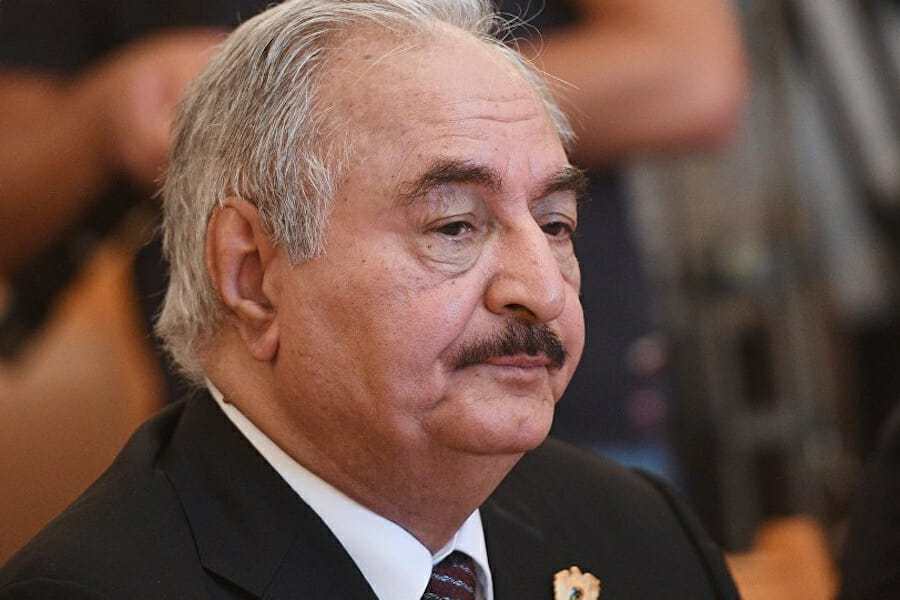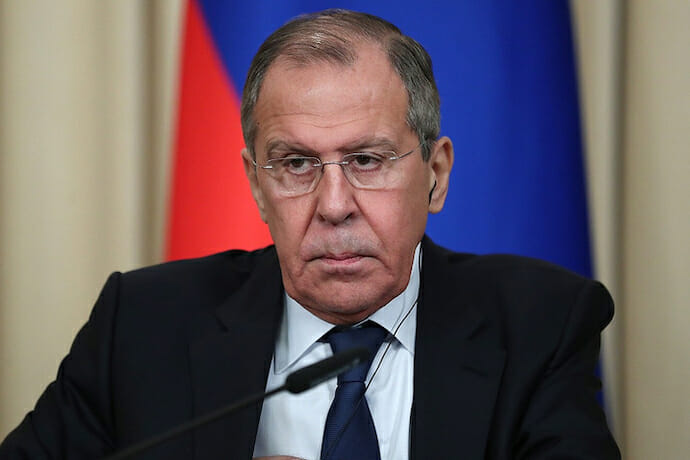
Russia’s Endgame in Libya
As Field General Khalifa Haftar ordered the Libyan National Army to take over the capital city of Libya, Tripoli, Russia joined other states to call on the Libyan actors to “remain calm and show restraint” as a statement from the Russian Foreign Ministry stated on Friday. The statement went on to emphasize how a “military scenario” could worsen the situation on the ground and “bring down the already extremely difficult situation in Libya” and would hinder the UN peace process. The announcement from the top Libyan general came out as soon as the UN Secretary-General António Guterres landed in Tripoli, which signals Haftar’s dissatisfaction with the UN attempts to build an intra-Libya reconciliation process that could weaken his hand in the war-torn country.
Russia issued its own statement and has not signed a joint statement issued by France, Italy, UAE, UK, and the US, while the UN Security Council failed to agree on a joint statement regarding the situation in Libya. Foreign Minister Sergei Lavrov went further to call on other stakeholders to “stop any offensive military action and embrace the negotiating table” and play a role to “prevent an escalation.” Aside from the United Nation’s efforts to convene an Intra-Libya dialogue in mid-April, Moscow has intensified its engagement with the major actors on the ground, while top diplomats on the Libya file in Russia’s foreign ministry had maintained contacts with the actors on the ground to avoid a major conflict in Libya’s capital. A number of concerns including the impact of a conflict on Libya’s capital have on oil markets has driven major countries (especially the US) to try to avoid any offense for now, but Russia has a different assessment.
As Russia’s policy on Libya is ambiguous, some experts argue that although Moscow continues to engage with all major parties on the Libyan conflict, Russia does support General Haftar and his army in order to “ensure stability” in Libya. This argument is driven by the view that Russia is always in favour of what some call “managed democracy,” which takes into account a strong government that has a monopoly over violence, whether or not it takes care of its citizens.
Although the events in Libya in 2011 after the NATO intervention served as a turning point in the Kremlin’s calculations in the Middle East, as some experts argue, Russia has not sent troops to Libya as it has in Syria to prop up Bashar al-Assad and to avoid what happened to Gaddafi in 2011, although Russian private security companies operate in Libya, and some news reports have argued that these private companies have backed Khalifa Haftar. Although Haftar would like to receive Russian support, Russia’s engagement in Libya so far is limited to food supplies and recent cooperation with the Libyan Central Bank to print new money for Libya.

Naturally, Russia tries to play a low profile in Libya, but Moscow engages with all major actors in the conflict to “embrace a dialogue among the major actors on the ground,” as the foreign ministry spokesperson stated in 2017 and which was recently reemphasized by foreign minister Sergei Lavrov. In a recent event in the Valdai Club in Moscow titled “Middle East: New Stage, Old Problems?,” Russia’s deputy foreign minister in charge of Middle Eastern affairs, Mikhail Bogdanov, argued that Russia is not taking sides on the Libyan conflict, but instead is ready to engage in a dialogue to find a solution to the ongoing conflict. Chiefly, there are two main goals that drive Russia’s policy in Libya both in the short and long term and they are:
First, expanding its presence in the Mediterranean Sea is a top priority for Russia’s strategy in North Africa, and Libya in particular. Since the days of the Russian Tsar, having access to the Mediterranean Sea was critical to Russia, and like the Soviet Union, it had a military base in Tartus, Syria, which hosted about 70 ships in this strategic waterway, although it suffered a major blow when Anwar Sadat of Egypt severed diplomatic ties with the Soviet Union and expelled thousands of the Soviets in 1972. By the way, Tartus was the only naval base outside the Russian territory that the Russian Federation had inherited from the Soviet Union. Having access to the waters of the Mediterranean Sea enables Russia to “monitor NATO and jihadism, as well as safeguard its trade interests (mainly oil and gas exports) which serve as a backbone to the Russian economy” as the former Spanish Ambassador to Russia and China Eugenio Bregolat argued. Aside from the balance of power, Russia’s Defense Minister, Sergei Shoigu, has described the Mediterranean Sea as “core to all essential threats to Russia’s national security,” and its increasing presence in the sea by creating a task force responsible for the Mediterranean is part of an overall naval modernization that Russia was doing for nearly a decade.
As the Mediterranean Sea remains the economic and strategic crossroads of three continents, this also offers Moscow an opportunity to project power beyond what it considers its own “backyard” – mainly Central Asia and the Caucasus as Eastern Europe has already joined the western institutions (NATO and the EU)– with the exception of Belarus and Ukraine. Tensions inside NATO – primarily between Turkey and the US also serve as a strategic gain for Moscow as policymakers in the Kremlin believe that they could wedge a drive between the NATO alliance, which is considered in Moscow as a “strategic threat” according to Russia’s national security strategy.
Second, to secure investment projects in a post-conflict Libya. During the Arab Spring and the events in Libya, Russia’s economic interests in the greater Middle East, especially in North Africa were threatened, as major Russian exporters lost an estimated billions of dollars in projects that related to both the arms and oil industry. Libya was one of the major countries in the region that had signed several multi-billion dollar deals, relating to arms and the energy industry. Before the Arab Spring, Moscow forgave billions of Libya’s debt in exchange to increase its involvement in Libya’s energy industry, but all of these major projects were lost as soon as the Gaddafi regime was overthrown. Russia’s economic interests were not only been threatened in Libya. Politically, the Kremlin lost its long-time ally Gaddafi, which was unacceptable to Vladimir Putin and played a major role in his decision to run the Kremlin for a third term in early 2012.
Currently, Russia’s economy has maintained huge losses due to its confrontation with the United States on multiple fronts, including Ukraine and Russia’s annexation of Crimea as well as other structural problems in the Russian economy. So it is important for Russia to increase its economic engagement with Libya and other Middle Eastern countries, and pursue cooperation on areas that are mutually beneficial for both sides, including arms exports, agriculture (grain exports) and the energy industry as Nikolay Kozhanov from the European University in St. Petersburg argued. Aside from the political tensions in Libya, it is still a member of the Organization of Petroleum Exporting Countries (OPEC), which has a close working relationship with Moscow to manage the oil prices, market shares and production cuts and recently Libya’s national oil corporation (NOC) signed an agreement regarding the “exploration and production” of oil with Russia’s Rosneft. Here is where engagement with Khalifa Haftar and his allies in Libya is critical for Russia. Haftar’s forces control most of Libya’s oil resources and engage closely with the Tripoli-based National Oil Corporation to export oil and receive revenue.
Russia’s engagement with the major warring factions in Libya should not come as a surprise. Moscow’s new flexible policy in the Middle East is intended to balance a number of different warring factions in the troubled region except internationally recognized terrorist organizations, and avoid dragging into regional conflicts in the region, which demonstrates a different strategy from the one that is pursued by the US. While this does not mean that Russia does not have its own redlines in the Middle East, this strategy of avoiding taking sides maximizes Moscow’s diplomatic leverage in the region (by offering a diplomatic mediation if needed to regional players that are not willing to talk to one another directly) and increases its economic footprint in the Middle Eastern market.
While Russia publicly refuses to support one side of the Libyan conflict against the other, and Haftar appears to miscalculate Russia’s intentions in Libya and how it would respond to an offense in Tripoli, the current tensions offers Moscow an opportunity to warm up its diplomatic contacts on the different sides of the conflict to find a solution. This could also help Russia preserve its long-term strategic and economic interests in Libya if this effort succeeds. As a lot of speculation now surrounds whether or not Russia will increase its diplomatic engagement in Libya or may host a conference on Libya (following Paris and Palermo), it seems that Moscow is the only player that could play the role of the mediator hosting the warring factions and find a political solution to the conflict.
